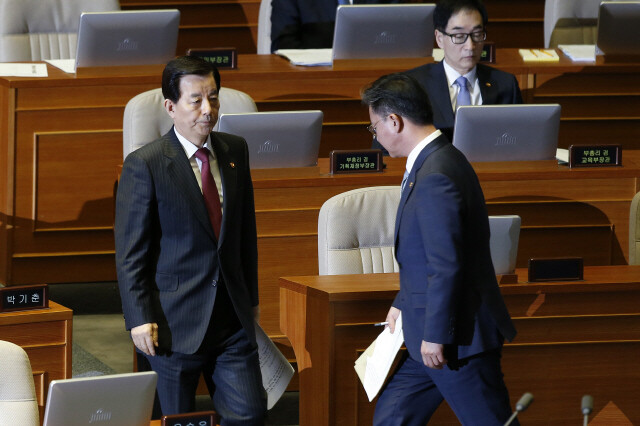hankyoreh
Links to other country sites 다른 나라 사이트 링크
Park’s administration officials parrot her groundless claims

With President Park Geun-hye reiterating the claim that North Korea appropriated funds at the Kaesong Industrial Complex for its nuclear weapons program without offering any evidence, not only Unification Minister Hong Yong-pyo, who admitted that there was no evidence for the claim, but also Prime Minister Hwang Kyo-ahn have echoed Park’s claim that workers’ wages were delivered to the leadership of the Korean Workers’ Party (KDP), which used them to develop nuclear weapons and long-range missiles.
“We have determined that 70% of the wages paid in dollars went to the KWP Secretariat and to Room No. 39. We have determined that this was used for nuclear weapons, missiles, and legacy projects,” Hong said in response to questions at the National Assembly on Feb. 18.
“We have determined that the wages paid to North Korean laborers went to the KWP leadership and that those funds are being used for nuclear weapons and missiles,” Hwang said.
Both Hong and Hwang used the expression “we have determined” that President Park used in her address to the National Assembly on Feb. 16. And just like Park, neither of the two offered any evidence for their claims.
“However, we have not determined exactly how much money went into this,” Hwang said, admitting that there was no conclusive evidence.
What these officials say was “determined” appears to be based on spy reports from the National Intelligence Service (NIS). When asked by lawmakers whether the NIS had confirmed this information, Hong said that he could not reveal the source, but an official with the Unification Ministry said on Thursday that Hong had stated that North Korea had appropriated the Kaesong wages for its nuclear program on Feb. 12 and Feb. 14 after assessing a variety of such reports.
The Unification Ministry is not a department that produces its own reports or intelligence about North Korea. The reports collected by the NIS are no more than unsubstantiated messages. It is only when reports from various agents provide evidence that a report is factual that one of these reports is regarded as being valuable intelligence.
“The fact that the US Treasury Department did not take issue with the wages at the Kaesong Industrial Complex or the fees paid by tourists at Mount Keumgang means that the US confirmed that this money was flowing into the public economy,” said Jeong Se-hyun, former Unification Minister and current standing representative of the Korea Peace Forum, when asked about the Blue House’s claims that the Kaesong wages were appropriated for developing weapons. “It’s necessary to conclude that the Kaesong wages were used in the public economy.”
According to a report by the Congressional Research Service (CRS), North Korea earned US$1 billion from exporting weapons over the four years between 1998 and 2001. This is why Jeong contends that “North Korea had no reason to divert the US$560 million that went into the Kaesong Complex over 10 years into the military economy.”
When Hwang was also asked on Thursday about President Park’s decision to completely suspend operations at the Kaesong Industrial Complex, he described this as a “policy decision” and said that it was not subject to any other laws.
But Article 17 of the Inter-Korea Exchange and Cooperation Act states that, before suspending any inter-Korean cooperation project, the Unification Minister must deliberate with the relevant ministries and must hold a hearing. Neither can the measure be seen as an exercise of the “emergency powers” described in Article 76 of the South Korean Constitution, since it did not satisfy the requirements listed there, such as it being impossible to convene the National Assembly.
By Kim Jin-cheol and Kim Ji-eun, staff reporters
Please direct questions or comments to [english@hani.co.kr]

Editorial・opinion
![[Editorial] Does Yoon think the Korean public is wrong? [Editorial] Does Yoon think the Korean public is wrong?](https://flexible.img.hani.co.kr/flexible/normal/500/300/imgdb/original/2024/0417/8517133419684774.jpg) [Editorial] Does Yoon think the Korean public is wrong?
[Editorial] Does Yoon think the Korean public is wrong?![[Editorial] As it bolsters its alliance with US, Japan must be accountable for past [Editorial] As it bolsters its alliance with US, Japan must be accountable for past](https://flexible.img.hani.co.kr/flexible/normal/500/300/imgdb/original/2024/0417/6817133413968321.jpg) [Editorial] As it bolsters its alliance with US, Japan must be accountable for past
[Editorial] As it bolsters its alliance with US, Japan must be accountable for past- [Guest essay] Amending the Constitution is Yoon’s key to leaving office in public’s good graces
- [Editorial] 10 years on, lessons of Sewol tragedy must never be forgotten
- [Column] A death blow to Korea’s prosecutor politics
- [Correspondent’s column] The US and the end of Japanese pacifism
- [Guest essay] How Korea turned its trainee doctors into monsters
- [Guest essay] As someone who helped forge Seoul-Moscow ties, their status today troubles me
- [Editorial] Koreans sent a loud and clear message to Yoon
- [Column] In Korea’s midterm elections, it’s time for accountability
Most viewed articles
- 1[Column] The clock is ticking for Korea’s first lady
- 2Samsung barricades office as unionized workers strike for better conditions
- 3[Editorial] When the choice is kids or career, Korea will never overcome birth rate woes
- 4[News analysis] After elections, prosecutorial reform will likely make legislative agenda
- 5Why Israel isn’t hitting Iran with immediate retaliation
- 6S. Korea, Japan reaffirm commitment to strengthening trilateral ties with US
- 7[Editorial] Does Yoon think the Korean public is wrong?
- 8[Guest essay] How Korea turned its trainee doctors into monsters
- 9[Editorial] 10 years on, lessons of Sewol tragedy must never be forgotten
- 10Strong dollar isn’t all that’s pushing won exchange rate into to 1,400 range